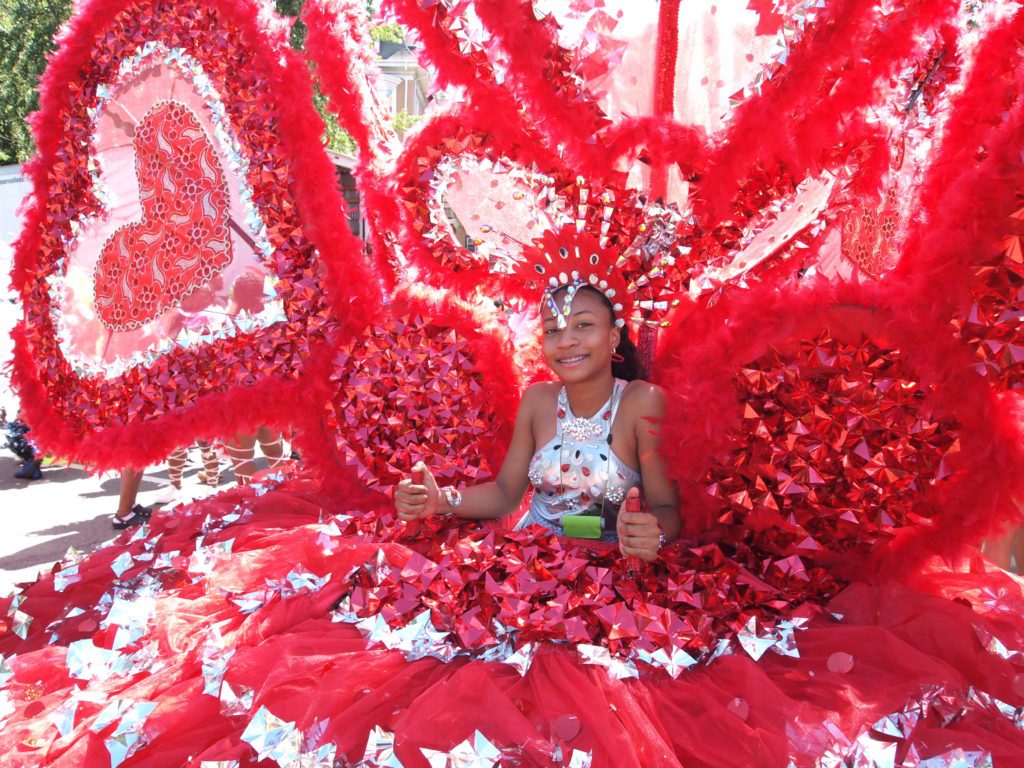Carnival returns to Hub Saturday
Festival will take place in Franklin Park with live music, shortened route

In an ordinary year, six designers would have given Akeshia Lewis costumes for sections in Misfit Carnival’s presentation.
But there hasn’t been a normal year since 2019. Last year, there was no Caribbean Carnival. This year, band leaders like Lewis didn’t find out about the Caribbean American Carnival Association of Boston’s (CACAB) plans to hold a shortened festival on Aug. 28 until June, when the group met and ironed out the details.
Band leaders leapt into action. Lewis turned to three of the designers she’s used in the past and got to work.
“We knew we needed costumes,” she said. “We knew people needed to play mas.”
This year, J’ouvert, the 5 a.m. celebration, will take place as usual, with revelers gathering at the intersection of Blue Hill and Talbot avenues and parading to Columbia Road. At noon, however, the masquerade bands will gather at the Shattuck Hospital, then, at 1 p.m. sharp march three-quarters of a mile to the Playstead area of Franklin Park.
“They’re going to be chipping all the way up to the Playstead,” said longtime CACAB President Shirley Shillingford, using the Trinidadian term that describes the dance step performed while following a band during Carnival.
At the Playstead, things should get even more interesting.
A bandstand will host five acts to keep revelers entertained: calypso legend Lord Nelson, soca artists Blaxx, Nadia Batson, Ricardo Drue and Haitian singer Vayb.
“I don’t think we’ve had anything of this magnitude,” said CACAB Treasurer Robert George.
In addition to the bands, the Playstead will host the usual assortment of vendors and West Indian food stands.
Lewis says she’s looking forward to the return of Carnival to Boston, but Sunday evening, as she and several band members were pouring body paint into the small plastic containers revelers will use on each other during J’ouvert, the enormity of the whole undertaking was palpable.
Although in a normal year, she would outfit as many as 340 masqueraders, this year it’s just 145. But then, in a normal year the design and assembly of costumes usually begins in September, after the U.S. Carnival season is over. This year, it began in June.
Add to the mix some pandemic supply-chain challenges, and the task of outfitting masqueraders is all the more challenging.
“Everybody is rushing their production, but materials are hard to find,” Lewis said.
Under such tough circumstances, the normal competition between masquerade bands was disrupted. Misfit banded together with competitors Socaholics and Soca & Associates to make bulk purchases of materials such as fabric, rhinestones and feathers that go into their costumes.
“Usually we’re in competition, but we’re still family,” Lewis said. “This year, we’re literally working as a team.”
In another forced alliance, all the masquerade bands will rely on just one sound truck, provided by Sound International. Shillingford says there will be eight bands participating this year. But Sound International follows the standard setup for sound trucks — an 18-wheel flatbed with a 10-foot wall of speakers facing every direction.
With the Delta variant driving an increase in COVID infections, Shillingford says this year’s Carnival will take extra precautions. All revelers and attendees will be asked to wear masks.
“We have volunteers who will be giving out free masks,” she said. “I’m very cognizant of what it means if people come in without masks.”
Shillingford, who works for the city’s Department of Public Health, said that outdoor masked gatherings, such as the Black Lives Matter protests held last year, have not triggered super-spreader events. She’s looking forward to the new format for Carnival, even if it’s just for this year.
“I’m thinking the turnout is going to be very big,” she said. “New York isn’t having a carnival, so some people may come here instead.”








